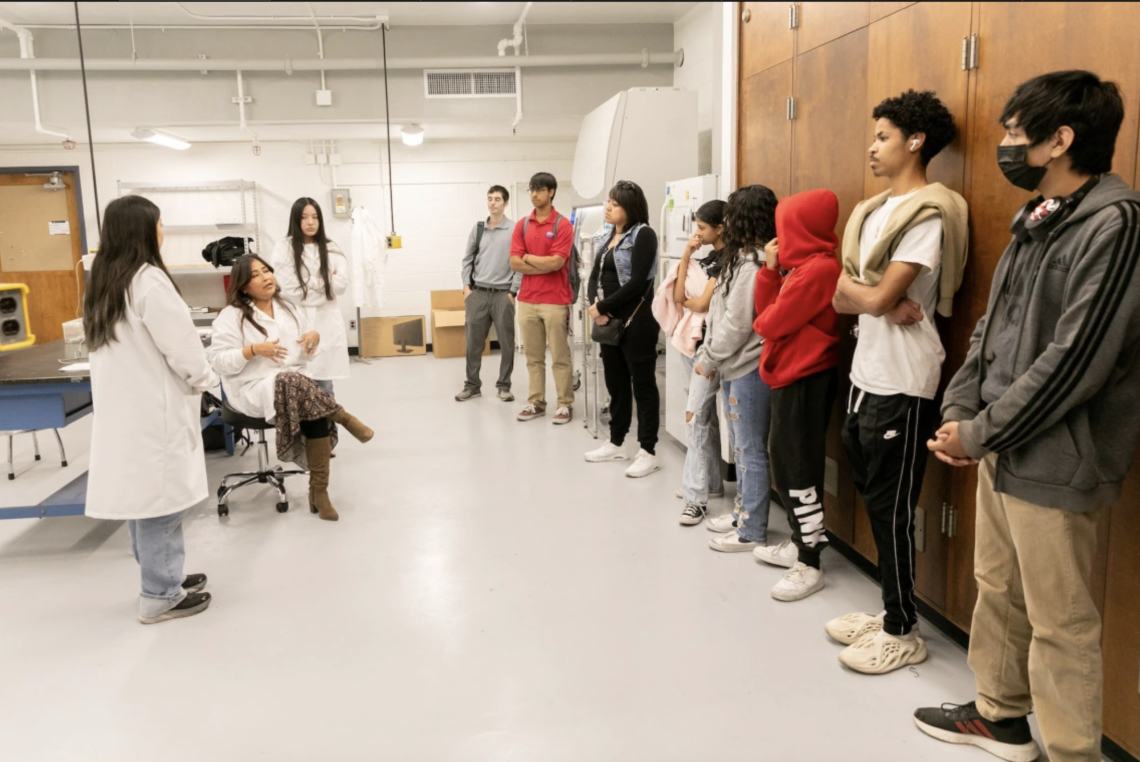Math tutoring program prepares Native American students for STEM careers

Tutees for the MESCIT program tour the lab of Cherie De Vore (seated at left), an assistant professor in the Department of Chemical and Environmental Engineering. MESCIT provides one-on-one math tutoring to local Native American middle and high school students, and brings them to campus for tours and to connect with U of A scientists and engineers from Native backgrounds.
Chris Richards/University Communications
A University of Arizona math tutoring program is helping prepare local Native American K-12 students for careers in engineering and science disciplines.
Since 2017, the Mentorship and Education in Science for Tucson program has served students from middle and high schools across Southern Arizona. Known as MESCIT – pronounced "mesquite" – the program's name refers to the tree native to the Southwestern U.S. and Mexico.
The program largely involves U of A juniors and seniors going to local middle and high schools to provide one-on-one math tutoring to students several times a week. The younger students are also invited to campus to explore the university's labs and hear from professional engineers.
The Office of Native American Initiatives in the university's Office of the Provost administers MESCIT in partnership with the College of Engineering and the Department of Astronomy and Steward Observatory in the College of Science. Freeport-McMoRan, a Phoenix-based mining company, also provides funding.
"During the COVID-19 pandemic, math education in K-12 was severely impacted, and students are significantly less prepared for college," said Gurtina Besla, a professor of astronomy who helped start MESCIT. "Programs like MESCIT, which focus on math preparation, mentorship and community connection, are critically needed."
Most of MESCIT's 10 undergraduate tutors for 2024-2025 are students in engineering and astronomy, though students from any major can apply to be tutors, said Amber Laughing, a research program administration officer in the Office of the Provost who helps oversee MESCIT's operations.
Two graduate students mentor the tutors, coordinate their schedules and drive them to the schools. Even though the middle and high schoolers are the ones receiving the tutoring, the program is designed to benefit all the students, Besla said.
"There's the benefit to the middle and high school students by helping them to visualize themselves as going to college by pairing them with undergrads, which opens a mentoring pathway as well as direct math tutoring," she said. "For the undergrads, they see themselves as leaders and mentors and they see how what they're learning in college can be inspiring to the next generation."
MESCIT has partnered with several schools and tribal departments in the Tucson area, serving between 30 and 50 tutees each year. Past partners have included Tucson Magnet High School and the Ha:ṣañ Preparatory & Leadership School, a bicultural public charter school that serves Tohono O'odham youth.
This year, the program serves roughly 20 tutees at four schools: Sunnyside High School and Desert View High School in the Sunnyside School District, and Mansfeld Middle School and Pueblo High School in the Tucson Unified School District. The program also partners with the Pascua Yaqui Tribe Education Department to offer tutoring for students at the Pascua Yaqui Tribe-University of Arizona Microcampus.
Undergraduate tutors are trained in teaching methods as part of the program, and many find they have a deep passion for teaching, Laughing said. Tutors return year after year to continue working in the program, she added – and that continuity has helped the program build connections and trust at the middle and high schools served. Tutors often see the same students each week for an entire academic year.
"What's unique about our tutors, I think, is that they're always trying to improve. If they just finish their first year, they come to their second wanting to learn how to do better," Laughing said. "We're really fortunate to build these partnerships with these schools because the tutors build on that trust."
Besla said she and Laughing are exploring ways to use digital tools to reach students in more remote areas. Besla added that MESCIT exemplifies the type of service a land-grant university should provide.
"This is where universities have the opportunity to step in so that we can increase opportunities for students to pursue career in STEM fields and support students to thrive," Besla said.

